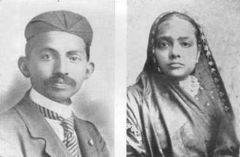Mahatma Gandhi
Mohandas Karamchand Gandhi (Gujarati: મોહનદાસ કરમચંદ ગાંધી, IAST: mohandās karamcand gāndhī, IPA: /moɦənd̪as kərəmtʃənd̪ gand̪ʱi/ (October 2, 1869 – January 30, 1948) was a major political and spiritual leader of India and the Indian independence movement.
He was the pioneer of Satyagraha—resistance to tyranny through mass civil disobedience, firmly founded upon ahimsa or total non-violence—which led India to independence and inspired movements for civil rights and freedom across the world. Gandhi is commonly known in India and across the world as Mahatma Gandhi (IPA: /mə'hɑt.mə 'gɑn.di/) (Sanskrit: महात्मा mahātmā – "Great Soul") and as Bapu (Gujarati: બાપુ bāpu—"Father").
In India, he is officially accorded the honour of Father of the Nation and October 2nd, his birthday, is commemorated each year as Gandhi Jayanti, a national holiday. On 15 June 2007, the United Nations General Assembly unanimously adopted a resolution declaring October 2 to be the "International Day of Non-Violence."
As a British-educated lawyer, Gandhi first employed his ideas of peaceful civil disobedience in the Indian community's struggle for civil rights in South Africa. Upon his return to India, he organized poor farmers and labourers to protest against oppressive taxation and widespread discrimination. Assuming leadership of the Indian National Congress, Gandhi led nationwide campaigns for the alleviation of poverty, for the liberation of women, for brotherhood amongst differing religions and ethnicities, for an end to untouchability and caste discrimination, and for the economic self-sufficiency of the nation, but above all for Swaraj—the independence of India from foreign domination.
Gandhi famously led Indians in the disobedience of the salt tax on the 400 kilometre (248 miles) Dandi Salt March in 1930, and in an open call for the British to Quit India in 1942. He was imprisoned for many years on numerous occasions in both South Africa and India.
Gandhi practised and advocated non-violence and truth, even in the most extreme situations. A student of Hindu philosophy, he lived simply, organizing an ashram that was self-sufficient in its needs. Making his own clothes—the traditional Indian dhoti and shawl woven with a charkha—he lived on a simple vegetarian diet. He used rigorous fasts, for long periods, for both self-purification and protest.
Alternate name: Mahatma Gandhi
Date of birth: October 2, 1869(1869-10-02)
Place of birth: Porbandar, Gujarat, British India
Date of death: January 30, 1948 (aged 78)
Place of death: New Delhi, India
Movement: Indian independence movement
Major organizations: Indian National Congress
Early life
Mohandas Karamchand Gandhi was born into the Hindu Modh family in Porbandar, in 1869. He was the son of Karamchand Gandhi, the diwan (Prime Minister) of Porbandar, and Putlibai, Karamchand's fourth wife, a Hindu of the Pranami Vaishnava order. Karamchand's first two wives, who each bore him a daughter, died from unknown reasons (rumored to be in childbirth). Living with a devout mother and surrounded by the Jain influences of Gujarat, Gandhi learned from an early age the tenets of non-injury to living beings, vegetarianism, fasting for self-purification, and mutual tolerance between members of various creeds and sects. He was born into the vaishya, or business, caste.
Gandhi and his wife Kasturba (1902)In May 1883, at the age of 13, Gandhi was married through his parents' arrangements to Kasturba Makhanji (also spelled "Kasturbai" or known as "Ba"). They had four sons: Harilal Gandhi, born in 1888; Manilal Gandhi, born in 1892; Ramdas Gandhi, born in 1897; and Devdas Gandhi, born in 1900. Gandhi was a mediocre student in his youth at Porbandar and later Rajkot. He barely passed the matriculation exam for Samaldas College at Bhavanagar, Gujarat. He was also unhappy at the college, because his family wanted him to become a barrister.

At the age of 18 on September 4, 1888, Gandhi went to University College London to train as a barrister. His time in London, the Imperial capital, was influenced by a vow he had made to his mother in the presence of the Jain monk Becharji, upon leaving India, to observe the Hindu precepts of abstinence from meat, alcohol, and promiscuity. Although Gandhi experimented with adopting "English" customs—taking dancing lessons for example—he could not stomach his landlady's mutton and cabbage. She pointed him towards one of London's few vegetarian restaurants.
Rather than simply go along with his mother's wishes, he read about, and intellectually embraced vegetarianism. He joined the Vegetarian Society, was elected to its executive committee, and founded a local chapter. He later credited this with giving him valuable experience in organizing institutions. Some of the vegetarians he met were members of the Theosophical Society, which had been founded in 1875 to further universal brotherhood, and which was devoted to the study of Buddhist and Hindu Brahmanistic literature.
They encouraged Gandhi to read the Bhagavad Gita. Not having shown a particular interest in religion before, he read works of and about Hinduism, Christianity, Buddhism, Islam and other religions. He returned to India after being called to the bar of England and Wales by Inner Temple, but had limited success establishing a law practice in Bombay. Later, after applying and being turned down for a part-time job as a high school teacher, he ended up returning to Rajkot to make a modest living drafting petitions for litigants, but was forced to close down that business as well when he ran afoul of a British officer. In his autobiography, he describes this incident as a kind of unsuccessful lobbying attempt on behalf of his older brother. It was in this climate that (in 1893) he accepted a year-long contract from an Indian firm to a post in Natal, South Africa.
When back in London in 1895, he happened to meet Colonial Secretary Joseph Chamberlain, the Radical-turned-ultra-Tory, whose son Neville became Prime Minister in the 1930s and helped suppress Gandhi. Chamberlain Snr. agreed that the treatment of Indians was barbaric but appeared unwilling to push through any legislation about this however.